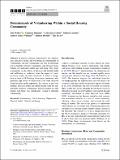Determinants of volunteering within a social housing community
Abstract
In general research demonstrates that deprivation, education, health, and well-being are determinants of volunteering, and that volunteering can play an important role in building stronger communities and provides many benefits for individual health and well-being. This study concentrates on the effects of physical and mental health and well-being as predictors when the aspect of socioeconomic impact has been minimised. It utilises a unique data-set from a UK Housing Association community with generally high levels of deprivation. Data were analysed using bivariate probit regression. In contrast to previous findings, physical health and mental health were not significantly related to volunteering. The key finding was that mental well-being was significantly related to informal volunteering.
Citation
Walker , T , Menneer , T , Leyshon , C , Leyshon , M , Williams , A J , Mueller , M & Taylor , T 2020 , ' Determinants of volunteering within a social housing community ' , Voluntas: International Journal of Voluntary and Nonprofit Organizations , vol. First Online . https://doi.org/10.1007/s11266-020-00275-w
Publication
Voluntas: International Journal of Voluntary and Nonprofit Organizations
Status
Peer reviewed
ISSN
0957-8765Type
Journal article
Rights
Copyright © The Author(s) 2020. This article is licensed under a Creative Commons Attribution 4.0 International License, which permits use, sharing, adaptation, distribution and reproduction in any medium or format, as long as you give appropriate credit to the original author(s) and the source, provide a link to the Creative Commons licence, and indicate if changes were made. The images or other third party material in this article are included in the article's Creative Commons licence, unless indicated otherwise in a credit line to the material. If material is not included in the article's Creative Commons licence and your intended use is not permitted by statutory regulation or exceeds the permitted use, you will need to obtain permission directly from the copyright holder. To view a copy of this licence, visit http://creativecommons.org/licenses/by/4.0/.
Description
The Smartline project is receiving up to £4,188,318 of funding from the England European Regional Development Fund (Grant No. 05R16P00305) as part of the European Structural and Investment Funds Growth Programme 2014–2020. The Ministry of Housing, Communities and Local Government (and in London the intermediate body Greater London Authority) is the Managing Authority for European Regional Development Fund. Additional funding is from the South West Academic Health Science Network.Collections
Items in the St Andrews Research Repository are protected by copyright, with all rights reserved, unless otherwise indicated.
Related items
Showing items related by title, author, creator and subject.
-
Strength in a weakened state : interpreting Hizb’allah’s experiences as a social movement and governing coalition in Lebanon 1985-2013
Bernhoff, Arthur (University of St Andrews, 2015-06-23) - ThesisThis study investigates Hizb’allah’s successful but competing dual development as an extra-institutional Shi’a social movement and an institutional political party. Hizb’allah has traditionally been studied from the ... -
Radical social innovations and the spatialities of grassroots activism : navigating pathways for tackling inequality and reinventing the commons
Apostolopoulou, Elia; Bormpoudakis, Dimitrios; Chatzipavlidis, Alexandros; Cortés Vázquez, Juan José; Florea, Ioana; Gearey, Mary; Levy, Julyan; Loginova, Julia; Ordner, James; Partridge, Tristan; Pizarro Choy, Alejandra; Rhoades, Hannibal; Symons, Kate; Veríssimo, Céline; Wahby, Noura (2022-04-05) - Journal articleIn this article, by drawing on empirical evidence from twelve case studies from nine countries from across the Global South and North, we ask how radical grassroots social innovations that are part of social movements and ... -
Wellbeing and social network characteristics in rural communities : findings from a cohort in social housing in Cornwall, United Kingdom
Long, Emily; Stevens, Sebastian; Topciu, Raluca; Williams, Andrew James; Taylor, Timothy; Morrissey, Karyn (2022-05-19) - Journal articleBackground: The mental wellbeing of those living in resource poor and rural localities is a public health priority. Despite evidence of a link between social networks and mental wellbeing, little is known about this ...

